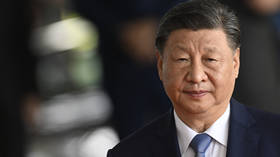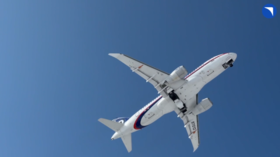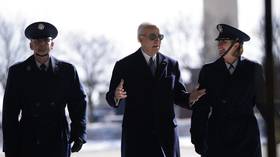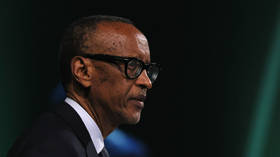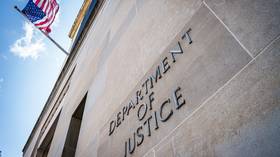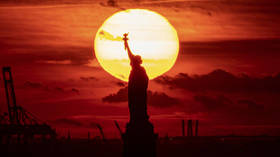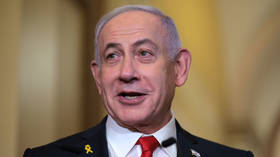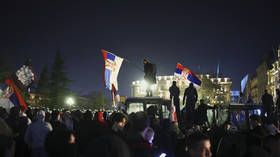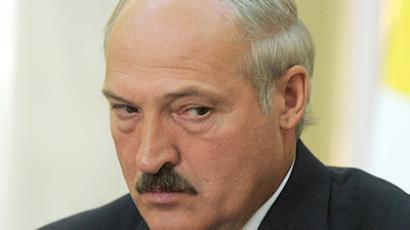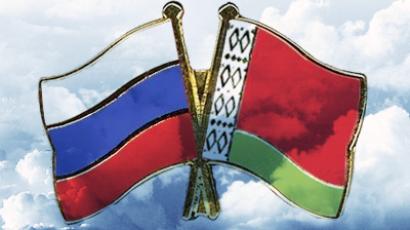Belarus unlikely to escape from Lukashenko’s iron grasp (anytime soon)
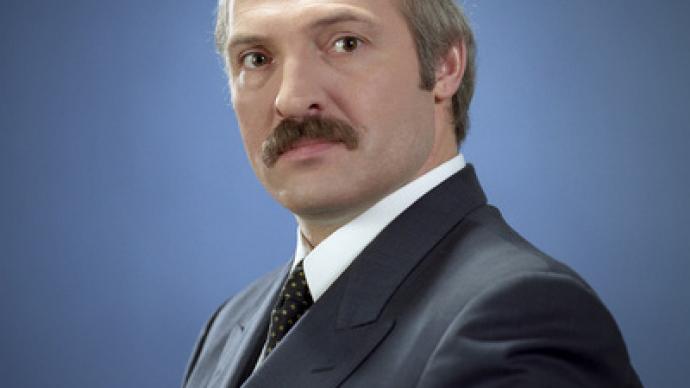
Belarusian opposition supporters have taken to the streets of Minsk to protest the almost certain re-election of President Aleksandr Lukashenko for a fourth term. There have been reports of clashes between the protesters and the police.
The opposition gathered in the capital’s center to demand a new vote, without Lukashenko taking part. They claim the election was rigged.“We do not want a run-off. New presidential and parliamentary elections should be held under the standards of the OSCE,” the head of the United Civil Party of Belarus, Anatoly Lebedko, said according to Itar-Tass. The demonstrators reportedly attempted to storm the government building, but were stopped by the police. At least three of the opposition supporters were injured. Vote counting is still underway but, according to pro-government exit polls, long-time leader Lukashenko has gained a clear victory, leaving his opponents far behind. On Sunday, Belarusians were making their choice between ten challengers, which is an unprecedented number for the former Soviet republic. Political veterans, businessmen, a journalist, a lawyer and even a poet – the candidates vary in their backgrounds as well as in political views: from purely pro-Russian to nationalistic.However, a true political battle for the country’s top job was unlikely to happen as none of the contenders could really slug it out with the main rival – the incumbent President Lukashenko.According to polls cited earlier by Belarusian state controlled media sources, the long-time leader could get about 71 per cent of the vote. Independent opinion research organizations came up with a bit more modest results of 31 to 41 per cent. In either case that would be a lot more than any of the other runners could hope for.The three most popular opposition candidates are deputy head of the United Civil Party Yaroslav Romanchuk, the leader of the campaign “Tell the Truth!” and also a poet, Vladimir Neklyaev, and a former deputy foreign minister, Andrey Sannikov. All lagging far behind Lukashenko, who has ruled the country with an iron grip ever since the institution of presidency was introduced in Belarus in 1994, shortly after the collapse of the USSR. And quite a large number of the 10-million-strong population seem to feel rather comfortable under the rule of “Batka” (or “father”), as many in Belarus refer to Lukashenko.Under the law, to win in the first round Lukashenko has to be supported by over half the voters. He personally would be happy with 70-75 per cent, he said in October during a conference with Russian media. “There is no need for 95 and 97 per cent like in previous times,” he added. Very few doubt that the 56-year-old will secure victory and get yet another term in office. It is not all about Lukashenko’s style of rule, which is often referred to in the Western media as dictatorship. If, among other things, the opposition managed to iron out the differences in order to overthrow the Lukashenko regime and come up with a single presidential candidate, there would be a better chance for them to at least expect some kind of competition.Lukashenko feels quite confident and made it absolutely clear that leaving the presidential seat is not in his plans. "No matter where you [the opposition] meet and what you do, you will not get the country. We will not let you tear it apart, because we have paid a high price for it … Those who are dreaming of a revolution should calm down: we reached our limit on revolutions last century," he said, addressing the parliament, RIA Novosti quoted Lukashenko as saying.But for now the main intrigue of this vote is likely to be what actually happens after it and how far the opposition will go in their attempts to prove – and they are pretty sure that is going to be the case – that the election is rigged. Another question is whether Lukashenko will play democracy this time and allow transparent elections or the results will still be slightly altered to show that “Europe’s last dictator” is still hugely popular among his people. Opposition to await results on a skating rink Seeing no point in waiting for any results to be announced, the Belarus strongman’s opponents called on their supporters to join a rally on Minsk’s October Square on December 19 evening, whereas authorities warned any gatherings are banned.“Even the power does not hold any social-political events here,” underlined the chairwoman of Belarus’s Central Election Commission, Lidya Yermoshina. She assured that there are no double standards applied here, but a general rule that all the country’s citizens must follow, cites the local Telegraf agency. After the 2006 presidential election, which Lukashenko won with over 82 per cent of the vote, protesters claimed the results were fishy and set up a tent camp on the central square, which was disbanded forcibly several days later, resulting in a number of arrests and clashes with police. Apparently bearing the previous unpleasant experience in mind, this time the Belarusian leadership got their ducks in a row.October Square was transformed into a huge skating-rink and a Christmas tree was erected in the middle. Meanwhile, tents have mysteriously evaporated from the capital’s shops, reported RIA Novosti.According to authorities, the opposition intends to organize mass disorders in the capital. Presidential Administration head Vladimir Makei announced that "They are preparing groups of militants and buying warm clothes, pyrotechnical devices and even explosives," cited RIA Novosti.Lukashenko warned that in case protesters attempt to gather at a place where meetings are banned, if they dare to “cross the Rubicon”, police and the military’s reaction should be adequate and tough. Speaking at a meeting of top security officials on Wednesday, the president stated that the opposition might seek provocations as they “need a picture…that the authorities are so ‘undemocratic’,” that Lukashenko has come to power again “treading on bones and blood,” Charter 97 website quotes. “Batka” added that it is most important “to protect people”.The opposition, for their part, assured that they do not want any conflicts and there will be no violence from their side. Despite the warnings against holding an illegal gathering, they do intend to appear at October Square and expect over 100,000 supporters to join them. The opposition asked people to bring salt or sand with them to avoid traumas on slippery ice. "Revolution is not the path to democracy. Revolution and violence cannot improve the condition of this country. Thus, we are interacting with other candidates and think that simultaneous presidential and parliamentary elections held next spring would be the best way out," presidential candidate from the United Civil Party Yaroslav Romanchuk told a media conference on Friday, cited by Itar-Tass.The police and interior troops have been put on high alert. The media reported that several truckloads of armed soldiers, about five armored personnel vehicles and up to 15 water cannons were moved in Minsk. Just in case. Water cannons could certainly become rather a convincing argument for protesters in the winter cold. Something old, something newMany analysts believe that Lukashenko who, thanks to his zigzag foreign policy spoiled previously strong ties with Moscow, is now trying to improve relations with the West, pursuing economic interests. Holding a free and fair election would be a step in that direction, along with a chance to get the $4 billion the EU promised. The 2010 presidential campaign has indeed been different from all the previous ones. It was marked by a number of novelties and record numbers. For the first time in 16 years the country enjoyed what can be referred to as electoral freedom. Or at least something close to it. Hundreds of foreign journalists and observers have arrived in Belarus to monitor the presidential election. OSCE monitors will be present for the vote count for the first time since 1994. The early voting though remains one of the weakest links of the Belarusian electoral system, which, the opposition believes, opens door to ballot fraud since it falls out of public control. It started five days prior to the Election Day and 12 per cent of voters – which means thousands and thousands of people – have already cast their ballots.While officials claimed the early voting went smoothly and no serious violations were reported, rights activist were not so certain. Belarusian Partisan website cited an observer, Valentin Stefanovich of Vesna center as saying that people were actually forced to vote in advance. Such violations were registered at 14.3 per cent of polling stations where independent monitors were present. In addition, the opposition news outlet posted a mobile phone video of students who are being, so to say, “insistently advised” to vote before December 19. Students, the military and workers from large state control plants are traditionally those who fall under pressure.Among positive changes is allowing presidential candidates to campaign actively, address large crowds and even hold election debates were held on state TV. The main candidate, though, did not show up. The opposition were not quite happy with the state of things, not only because Lukashenko refused to participate in the debates. They complained that were given only a very limited time to address the TV viewers while Lukashenko has held a monopoly on the country’s channels which climaxed in a three-hour long address to the All-Belarusian People’s Council on December 7 broadcast live. The gifted orator has traditionally colored his speech with metaphors, masterfully portraying himself as a man who is ready to sacrifice his well-being for the sake of the nation’s happy future and prosperity. Having boasted Belarus’s (and therefore his own) previous achievements, Lukashenko was also generous with promises to improve people’s life on the whole as well as the business climate in the country. Not quite impressed with the fiery rhetoric, Belarusian “Solidarnast” newspaper recalled Lukashenko’s previous promises. And, according to report, it turns out not everything is as good as it sounds from the orator’s tribune. Among the top “Batka’s” failures the paper names is his demographic program. He vowed to increase the population of the country threefold. But the result has been the opposite: during his time at the office the Belarusian population has dropped from 10,117,000 to 9,465,000. His housing program was not a success either. In fact, the paper writes, Belarus is now listed fifth among countries where it is most difficult for people to get their own roof. Fighting crime, alcoholism and bringing life of pensioners to a higher level were listed as having failed as well.Twists and turns in Moscow-Minsk relationsRelations between Moscow and Minsk, once warm and neighborly, have been tense, especially in the last couple of years. The main obstacles were Lukashenko’s refusal to recognize the independence of South Ossetia and Abkhazia and Minsk’s unwillingness to pay market price for Russian fuel. “I cannot agree when one the New Year’s Eve prices are increased twofold,” he stated. “People are celebrating while [in Belarus] everyone from the president to heads of departments and ministries are busting a gut in Moscow begging for…a barrel of oil or a cubic meter of gas,” he said in his address to the people’s council earlier this month.Lukashenko, apparently to annoy Moscow, was enjoying friendly relations with Georgian President Mikhail Saakashvili. Russia, for its part, came up with scandalous documentaries shown on Russian TV channels, in which the Belarusian leader was accused of oppressing and disposing of his opponents.Throwing stones at Russia became part of Lukashenko’s presidential campaign and, certainly, did not favor the improvement of bilateral relations. Back in October, speaking in his video blog, President Medvedev said that “appointing Russia Belarus’ enemy” greatly surprised him, taking into consideration the scope of aid effort to Belarus on Russia’s part.However, closer to his D-day, Lukashenko suddenly smoothened his stance. He traveled to Moscow earlier in December where agreement on a number of key fronts was reached. Russia agreed to scrap duties on oil it supplies to the country from the beginning of 2011, which Minsk had long been seeking. That will save Belarus an estimated $4 billion. Lukashenko praised President Medvedev’s move as “truly manly” and said that the Belarusian government in turn had agreed to pass on to Moscow the export duties it charges on products it makes from the imported Russian oil.“If I had to surrender for $4 billion a year, for that price I’m ready. It’s the money for our people and the state,” Lukashenko commented, as quoted in the Belarusian media. “If someone says that these are PR decisions, OK, let them be PR. But it is four billion.”The Kremlin is now also being purely pragmatic in relations with Lukashenko and no forecasts are being made for after the election. Anyway, it is now for only Belarusian people to make their choice and decide whether they want to see anyone else ruling the country or they prefer not to take any risks and let “Batka” rule the game.
Natalia Makarova, RT
Read Fyodor Lukyanov's column here



